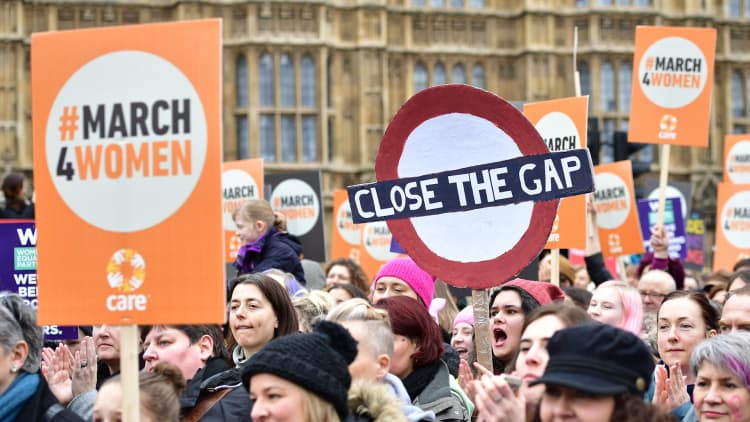The gender pay gap has widened at some financial services firms with offices in the UK. According to experts, that gap isn't likely to close anytime soon.
A range of companies reported double digit gaps in UK offices since the government has required companies with more than 250 employees to file annual disclosures. This is the second year that companies will report their pay data.
Of the banks that have shared their 2018 figures so far, HSBC reported an increase of 1 percent (for a gap of 30 percent) while international bank Nomura showed an increase of 1.5 percent (for a gap of 38.4 percent).
Other big firms haven't released their latest 2018 numbers yet, but had substantial pay gaps in 2017 reports. Big players with gaps on last year's reports include J.P. Morgan Ltd and Barclays, which disclosed gaps of 54 percent and 43.5 percent, respectively. The government has asked companies to file their disclosures by April 2019.
Pay disparities are fueled, in large part, by men holding more senior, higher-paying roles, according to experts. These structural issues are hard to change, according to Harvard economist Claudia Goldin.
Firm's incentive programs are structured to provide promotion and partnership offers once people reach their mid-thirties — a stage when women are more likely to leave work to raise families.
Companies "can jump up and down, say they're going to mentor and stop the tenure clocks, but it doesn't really work," she told CNBC Make It.
"They're not doing it to be malicious or to hurt women," Maddy Dychtwald, author and co-founder of the think tank Age Wave, told CNBC Make It. "Part of this outcome is cultural," she says, "and the fact that women have a different life journey than men."
Firms who responded to CNBC Make It requests for comment cited initiatives to hire more women to senior roles, efforts to recruit more women at both student and experienced hire levels, and programs that allowed for flexible work schedules.
Still, companies acknowledge that a change in the pay gap will take time.
"Some of the steps we're taking, such as encouraging more women into the business at entry level, are having a short-term impact on our statutory reported median pay gap," Emma Codd, managing partner for talent at Deloitte UK, told CNBC Make It. But overall, Codd said, "our actions are getting results."
Deloitte saw a slight increase in its hourly median pay gap, but saw a reduction in its total earnings gap when accounting for employees and partners.
Additionally, vesting of equity awards made in previous years could widen disparities temporarily at some companies.
Progress will indeed be slow. The Women in Finance Charter, which pledges for gender balance across financial services, found that firms would need to hire at least 2,300 female senior managers by 2022 to hit pay gap targets.
More broadly, the 2018 Global Gender Gap Report estimates it will take 202 years for economic equality between men and women to be achieved around the world.
That said, experts acknowledge that the UK government's reporting requirements are still a positive step towards gender equity.
Requiring companies to publicly reveal this data and explain it is "an effective strategy," said Steve Hine, a labor economist at the Minnesota Department of Employment and Economic Development. "You raise awareness of issues when you can present data on a topic like this."
Like this story? Subscribe to CNBC Make It on YouTube!
Don't miss: There's a gender pay gap for congressional staffers – and it's worse among Republicans



